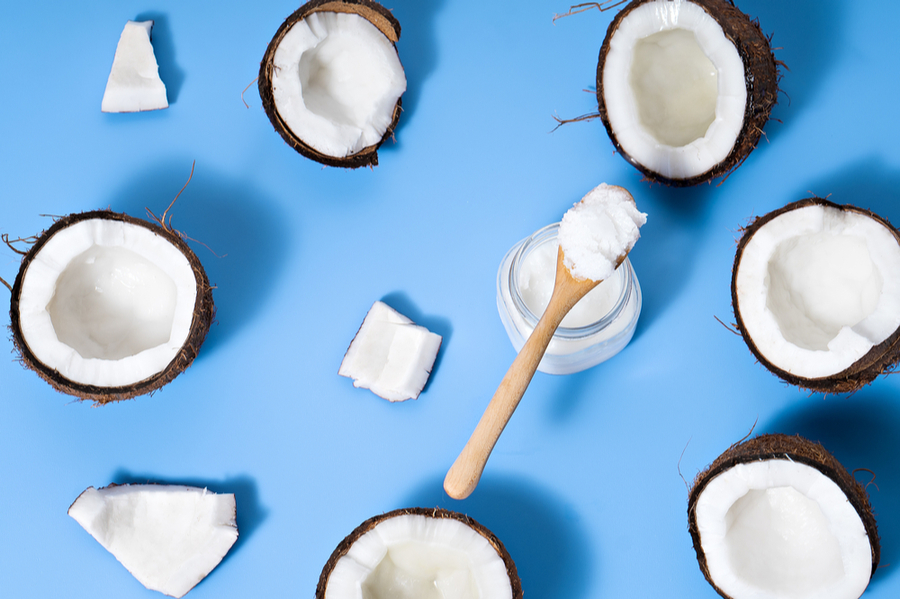
Despite everything that the internet has told you, coconut oil is bad for your skin. Sure, your skin does need an emollient moisturizer to help prevent water loss. An emollient moisturizer is especially important for dry skin and those with many other skin conditions. And while coconut oil is naturally occurring, when applied to your skin, it can make your skin worse.
Coconut oil is comedogenic
Coconut oil has one of the highest comedogenic ratings, which means it’s a big no-no for those with sensitive or acne-prone skin. Coconut oil can’t penetrate the pores, which means it is essentially suffocating your skin and clogging your pores as it sits on top of the skin. The reason why you don’t want an occlusive barrier of saturated fat to sit on top of your skin is because it can also raise the temperature in the body. One of the most important functions of our skin is body temperature regulation. Those with chronic rashes and sensitive skin already have issues with releasing heat, so slathering coconut oil is only going to worsen the condition even further.
While there are a lot of factors, such as your pore size and your skin type, that can affect how your face will react to comedogenic products, the best thing to do is steer clear!
Coconut oil is too alkaline
Your skin has a natural pH level and it’s not a good idea to interrupt it! Even with a natural product like coconut oil. “H” is a measure of acid-base strength on a scale from 0-14. For example, pure natural water is somewhere in the middle with a neutral pH of 7.
Coconut oil has a pH of 7-8 and if healthy skin’s natural pH is around 5, it means that coconut oil is essentially 100-1,000 times more alkaline than your skin. This can cause havoc on your skin and make any skin condition you have a lot worse!
Coconut oil messes up your skin’s microbiome
Many people know that you should avoid using anti-bacterial soaps and hand sanitizers because they increase your risk of rashes like eczema and psoriasis. When your skin does have a rash, one of the major problems is dysbiosis (or imbalance) of the skin’s healthy microbiome.
The skin’s microbiome helps skin stay healthy and maintain a tight barrier protection from the outside world. Many people don’t know that coconut oil can kill microbes including bacteria, viruses and fungus. In fact, a product with as little as 5% coconut oil can kill several types of bacteria.
While it’s ok to use for certain fungal rashes, regularly using coconut oil is not a good idea. Natural antimicrobials can disrupt the balance of the skin’s microbiome, which may affect your immune system and barrier function and increase inflammation, which can lead to dysbiosis.
It’s not the best oil for your skin
Though we are discouraging you from using coconut on your skin, this doesn’t mean that all oil is bad! In fact, there are a lot of other natural oils you can use on your skin that will be more beneficial.
Some recommended plant oils include jojoba oil, avocado oil, sesame oil, sunflower seed oil, and castor oil. Each has different elements in them and can help your skin from the inside-out in different ways.
For example, Jojoba oil is great for your skin because of how similar it’s consistency is to human sebum, which is an oily substance naturally produced by your skin that lubricates and waterproofs your skin. This lowers your risk of clogging your pores.
Also, avocado oil is another great oil to try because it contains many vitamins, minerals, and skin-supporting oils like linoleic acid. It’s perfect for dry, damaged, or chapped skin. Sesame oil is great because it has anti-inflammatory properties, which helps promote healthy skin barrier function.
So, despite popular belief, coconut oil is bad for your skin. The reality is, it’s not going to help you get clear skin or whatever other promises of magical results you might have read about on natural health blogs. Coconut oil basically puts you at a risk of experiencing more challenges than solutions if you’ve got chronic skin conditions.
And while you might not want to completely rid yourself of coconut oil in your routine, try to stop using straight coconut oil on your skin. Cut out or minimize products where coconut oil is at the top of the list of the main ingredients of the product. Again, try looking into trying the far better options of oils that are available. You’ll be happy once you start seeing improvements in your skin!
